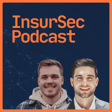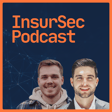
Travis Kroger - The Batman of Cyber Insurance
In this episode, we're joined by Travis Kroger, the "Batman of Cyber Insurance," to discuss his unique approach to cyber insurance. Travis was tasked early on with becoming his agency's cyber expert. Through consistent learning and relationship building, he's excelled in an area most insurance brokers avoid.
Travis explains how he partners deeply with clients to implement critical controls and conduct tabletop exercises, bringing tremendous value beyond just policy placement. We discuss the rollercoaster cyber insurance market, the limitations of admitted carriers, and why MGA solutions fill an important gap despite contributing to pricing volatility.
Throughout the wide-ranging conversation, Travis drops knowledge on attracting billion-dollar accounts, the overlooked potential in tech E&O, and why cyber will remain a profitable coverage line. With infectious passion for helping clients manage risk, Travis epitomizes the next generation of cyber-focused agents.

